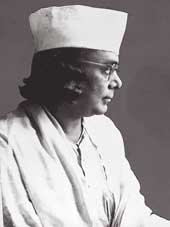O Mon Romzaner Oi Rozar Sheshe
O Mon Romzaner Oi Rozar Sheshe is a popular Bengali song that is traditionally sung during the Eid ul-Fitr celebrations. The song is an integral part of the cultural heritage of Bengali Muslims and is often associated with the end of the Ramadan fasting period.
Background[edit | edit source]
The song "O Mon Romzaner Oi Rozar Sheshe" was written by the renowned Bengali poet Kazi Nazrul Islam, who is also known as the National Poet of Bangladesh. Kazi Nazrul Islam is celebrated for his contributions to Bengali literature and music, and his works often reflect themes of social justice, spirituality, and humanism.
Lyrics and Theme[edit | edit source]
The lyrics of "O Mon Romzaner Oi Rozar Sheshe" express the joy and spiritual fulfillment that comes with the conclusion of Ramadan. The song captures the essence of Eid ul-Fitr, a festival that marks the end of a month-long period of fasting, prayer, and reflection. The song's lyrics are imbued with a sense of gratitude and celebration, reflecting the communal and festive spirit of Eid.
Cultural Significance[edit | edit source]
"O Mon Romzaner Oi Rozar Sheshe" holds a special place in the hearts of Bengali Muslims. It is often performed in various cultural programs, religious gatherings, and media broadcasts during the Eid celebrations. The song's enduring popularity is a testament to its deep cultural resonance and its ability to evoke a sense of unity and shared identity among Bengali Muslims.
Musical Composition[edit | edit source]
The musical composition of "O Mon Romzaner Oi Rozar Sheshe" is characterized by its melodious and uplifting tune. The song is typically performed with traditional Bengali musical instruments, such as the harmonium, tabla, and dhol. The melody and rhythm of the song are designed to evoke a sense of joy and festivity, making it a perfect accompaniment to the celebratory atmosphere of Eid.
Legacy[edit | edit source]
The legacy of "O Mon Romzaner Oi Rozar Sheshe" extends beyond its immediate cultural context. The song is a symbol of the rich musical and literary heritage of the Bengali-speaking world. It continues to be a source of inspiration for contemporary artists and musicians, who often reinterpret and perform the song in various modern renditions.
See Also[edit | edit source]
References[edit | edit source]
External Links[edit | edit source]
Search WikiMD
Ad.Tired of being Overweight? Try W8MD's physician weight loss program.
Semaglutide (Ozempic / Wegovy and Tirzepatide (Mounjaro / Zepbound) available.
Advertise on WikiMD
|
WikiMD's Wellness Encyclopedia |
| Let Food Be Thy Medicine Medicine Thy Food - Hippocrates |
Translate this page: - East Asian
中文,
日本,
한국어,
South Asian
हिन्दी,
தமிழ்,
తెలుగు,
Urdu,
ಕನ್ನಡ,
Southeast Asian
Indonesian,
Vietnamese,
Thai,
မြန်မာဘာသာ,
বাংলা
European
español,
Deutsch,
français,
Greek,
português do Brasil,
polski,
română,
русский,
Nederlands,
norsk,
svenska,
suomi,
Italian
Middle Eastern & African
عربى,
Turkish,
Persian,
Hebrew,
Afrikaans,
isiZulu,
Kiswahili,
Other
Bulgarian,
Hungarian,
Czech,
Swedish,
മലയാളം,
मराठी,
ਪੰਜਾਬੀ,
ગુજરાતી,
Portuguese,
Ukrainian
Medical Disclaimer: WikiMD is not a substitute for professional medical advice. The information on WikiMD is provided as an information resource only, may be incorrect, outdated or misleading, and is not to be used or relied on for any diagnostic or treatment purposes. Please consult your health care provider before making any healthcare decisions or for guidance about a specific medical condition. WikiMD expressly disclaims responsibility, and shall have no liability, for any damages, loss, injury, or liability whatsoever suffered as a result of your reliance on the information contained in this site. By visiting this site you agree to the foregoing terms and conditions, which may from time to time be changed or supplemented by WikiMD. If you do not agree to the foregoing terms and conditions, you should not enter or use this site. See full disclaimer.
Credits:Most images are courtesy of Wikimedia commons, and templates Wikipedia, licensed under CC BY SA or similar.
Contributors: Prab R. Tumpati, MD

